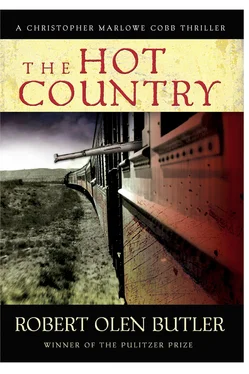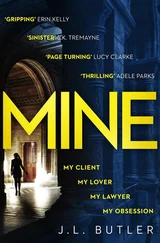I heard the low voices of the girls out in the courtyard, about to have their siesta. I almost stepped to the door, and I knew all I had to do was appear there and she would rise and come in to me. She had already laid me out on the bed.
But I went to the desk and pulled the one drawer completely from its enclosure and removed Mensinger’s wallet and I laid it on the desktop. I put the letter back in its envelope. I removed the train ticket and made sure I had its departure day and time right. Tomorrow. Early. I slid it back into its compartment. I put the wallet in my pocket, replaced the desk drawer, hesitated one moment more at the voices of the girls outside, and then I went to the front door and through.
Diego was sitting on the stoop.
He jumped up as I stepped out. “Boss,” he said. “You wanted me to come by the portales . You were gone.”
“Do you know how to write?”
He popped his head back a little at the question. It surprised him. Then his lower lip pooched up slightly and he shrugged. He didn’t. He regretted it. He was a good boy. I wondered where he lived, who was there.
“I’ve got it covered,” I said. I looked carefully around the street and no one was near, no one was watching from afar.
“Come close,” I said, and Diego and I huddled in the doorway. From my pockets I pulled the wallet and a note I’d written on a scrap of paper in a crude, childlike hand. objeto perdido. Lost object. I slipped it into the fold of the wallet with an end sticking out prominently and handed it to him.
I said, “I want you to wait hidden till you are very sure no one is going in or out of the German Consulate. Then I want you to put this in front of the door and run away quickly. Don’t knock. Just run. They’ll find it. Do you understand?”
Diego gave me his narrow-eyed, independent-thinking look.
“This is what I’m telling you to do,” I said.
“You want to get this back to Scarface with him thinking somebody just found it lying around. Is that right?”
“Yes.”
“He didn’t lose it. He knows that.”
“Lying around because the thief took the money and ditched the wallet with the worthless stuff still in it. Somebody found it and wanted to give it back.”
“Why would he run away?”
“He’s afraid if he shows himself, the Germans will think he was the one who stole it.”
“No poor Mexicano will think like that. He could get a reward. I’ll knock on the door and I’ll ask. .”
“No,” I said. And I snatched the wallet from him.
“Wait,” he said.
“You do it exactly my way or the boss fires you.”
Diego grabbed at the wallet but I pulled my hand back and straightened up to keep it away.
He continued to grab in vain, as I kept it just barely out of his reach to make him understand he could have it back only if he behaved. I did this even as I simultaneously tried to reason with him, an impulse he oddly seemed to provoke in me. “I don’t need this to be perfect. If they wonder, let them wonder. I want them to get it back with at least the possibility it was just locals. And I want you safe.”
This last assertion made him stop grabbing at the wallet. His hand fell. He looked at me closely. I didn’t know what was going through his head now, but he’d gone very still. Then Diego said, “So maybe the thief’s papi makes him do it. But he’s a poor man, the papi, so he keeps the money and he makes his son give back the rest.”
My first thought was that I doubted the Germans would look at it that way. Not that I’d say it, because it would just cause him to sass and defy me some more. But my second thought made me go very still: He’d cast me in the role of papi again. And now I found myself thinking: He’s not just sassing and defying; he’s trying to reason with me.
I put my hand on his shoulder. “Sure,” I said. “They may think that.”
He lifted his hand and I put the wallet in it.
And he was quick: He was under my arm and took one step into a run. But I was quick too: I grabbed him by the collar on his shirt. “Slow down, Diego Cordero. If you want to do this cleverly, you do it slow. Watch the consulate for a while. Out of sight. Make sure no one is moving in there, no one is coming along the street.”
He looked up at me. And he gave me one firm little nod. I let him go. He slipped the wallet inside his shirt and he stepped away, started to move off down the street at a stroll. He was still in earshot and I was about to call him un niño bueno, a good boy. But I’d learned my lesson about Diego Cordero. “ Un chulo callejero, ” I said. A good street punk. He rolled his shoulders but did not look back. I knew he was pleased.
And I stepped off the other way. I headed for the Hostal Buen Viaje .
The old man who’d been sleeping this morning at the desk had now vanished altogether. In the lobby there was only fly buzz and the distant huffing of a train engine and Gerhard’s name still chalked on the lodgers board. Most of the other rooms were empty.
I stepped into the ragged courtyard. The loopy drone of the flies increased, but behind that was only silence. In my normal operating area — on or around or approaching or retreating from a place of battle, be it the volcanic mountaintops of Nicaragua or the streets of Sofia — I had a pretty acute sense of the wrongness about a situation. But my first thought now was simply that I’d missed him, he’d gone out already.
This thought did not last for long. I took a step into the courtyard and another and the silence was starting to thicken into aftermath, into a thing that made me move more quickly to Gerhard’s door and I found that with my first knock it yielded a little bit, unlatched, and I pushed it open and he was lying in the center of the floor, filling the tiny room with his sprawled body, his head surrounded by the wide penumbra of his blood, his throat slashed, his eyes open sightless to the ceiling. I leaned back into the door, clicking it shut, steeling myself in the way of the battlefield. I’d seen a thousand men dead, a hundred alive in this moment and dead in the next, but this one was personal, this one was very personal. And I thought perhaps my own visit to him this morning contributed to this. And I thought this was all getting very big, whatever I was after here. And I thought I was thinking just to keep myself from letting go to the urge to run.
I breathed deep and let it out, once, twice. I became the war correspondent, the reporter. The blood looked fresh. This was recent. He was still wearing his outing pants and he’d put on a plaited dress shirt but didn’t get to the collar. The shirtfront’s whiteness was sprayed with red. There were relatively few flies, no vermin. Recent. I looked around the room. His open music case lay on the narrow bed, the horn removed and dropped beside it. The bed was angled away from the wall. There wasn’t much to search, but the killer did it thoroughly. Gerhard’s clothes were scattered at the foot of the bed, his leather suitcase gaping open, mouth down, against the floor. On this side of the room, a small chair was leaning on two legs against the wall. On the floor, near the chair, was Gerhard’s wallet, open. I stepped to it, bent to it, touched it lightly with my fingertips to see that the money compartment was empty. But I did not think for a moment that this was a robbery.
I straightened and I looked back to Gerhard. His body had preoccupied my first glance at him. Now I could see two things beside him. On the floor to his right, near his slack hand: a folded white paper. On his other side, isolated on the floor, a pale-blue-covered booklet. REISE-PASS . The German Imperial Eagle. Gerhard’s passport.
Читать дальше












